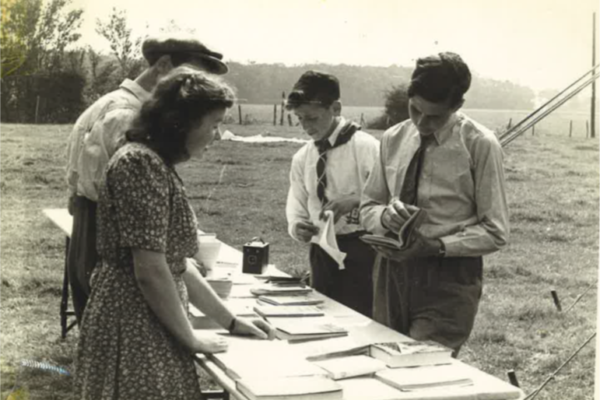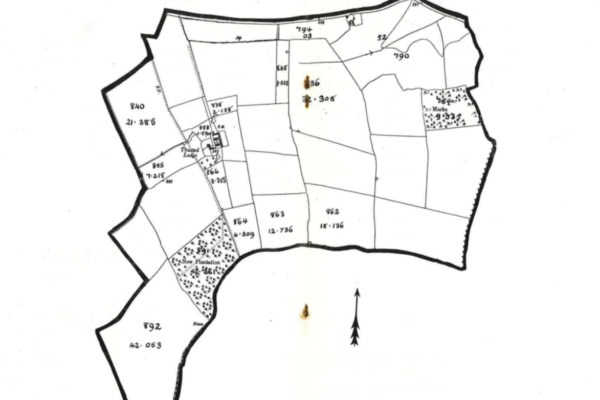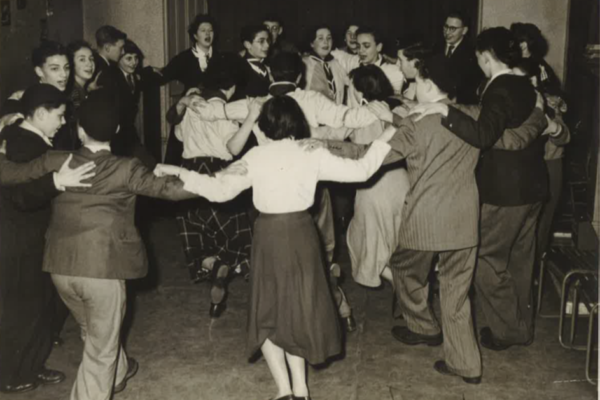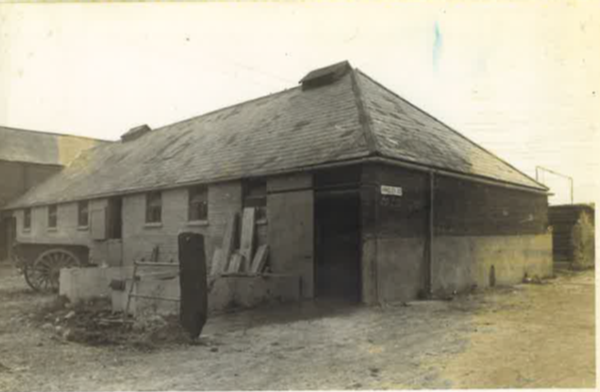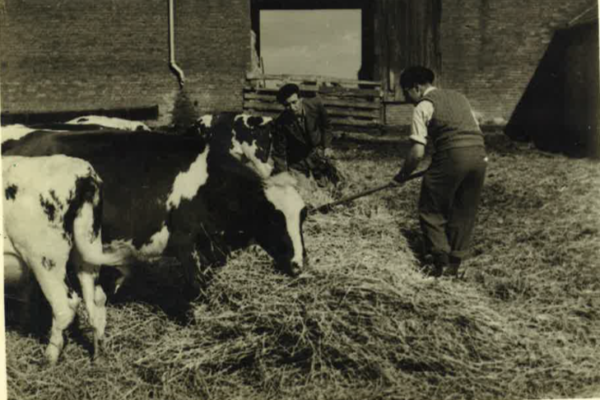Walter Bingham's Memories
The very beginnings of Bnei Akiva By Walter Bingham
Doesn’t time fly? And it was almost like yesterday, when on the 25th of July 1939 with a group of other Shabbat observant boys and girls I joined the Kindertransport at the Railway Station in Karlsruhe,Germany as member of Brit Hanoar, the youth wing of Bachad, (Brit Chalutzim Dati’im) to be taken to England. At about that time, but unbeknown to us the name changed to Bnei Akiva, which probably makes me today the oldest Bnei Akiva boy.
I was waiting since 1938 to get my immigration papers for Palestine to join a Kibbutz there. To that end I was sent to an agricultural preparation camp (Vorbereitungslager) in Hamburg-Blankenese, where I recall having spent I believe some 6 weeks. The only reason for going to England was to wait there rather than in Germany for the ‘Zertifikat’, the visa for Palestine.
It was a moment of mixed emotions, when we waved good bye to our parents who obviously suppressed their tears as the train started to move. They were the heroes to send their children, in my case the only child to a strange land, when a World War was imminent. Our own sadness at leaving ‘home’ was tempered by the sense of adventure, going on a big train to another country.
The journey took us to Hook Van Holland to embark on the overnight boat to England. There was one worrying moment during the journey, when at the German – Dutch border uniformed German officials entered the train to check our identity against the passports that were held in bulk by an accompanying Mardrich. That was my last encounter with a Nazi, until WWII in the British Army, followed by a first time on what seemed to me to be a very big ship. All I saw before then were barges and pleasure cruisers on the River Rhine. After a good night’s sleep and communal Shachrit it was time to eat. I had never seen pure white sliced bread before and remember distinctly that I told the server that “I don’t eat cake for breakfast”. That I hope may one day be the title of a book if I get round to finishing it.
The train journey from the port of disembarkation at Harwich took much longer than it does today, but we made it and on the platform at Liverpool St. Station I realised that we were hundreds of Children. As Kindertransport was an umbrella term and because the children went to different destinations, we were separated into groups, according to information on the cards around our neck. Some went to pre-arranged foster parents, others to relatives, many were sent to hostels from where prospective foster parents selected a child of their choice. My group was for Hachsharah and taken to Great Engeham farm at Woodchurch nr. Ashford in Kent where I stayed, sleeping in an old fashioned railway carriage with engraved windows reading ‘non smokers’ or ‘Ladies’ ! Those were the days! After about 4 weeks I was selected for the advance party to prepare our final destination which was Gwrych Castle at Abergele in North Wales, the former seat of Lord Dondonald. It was secured by contract just days before my arrival with the help of the late Rebecca Sieff, and the Balfour family. Sieff, who besides her work for Youth Aliyah was also the co-founder of WIZO in 1922.
We were collected in red busses of the Welsh bus company Crossville and the journey took many hours. In those days motorways were not yet dreamt of. From a distance we could see Gwrych Castle perched atop a low hill, overlooking the Irish See. What a magnificent place I thought, until I went inside. Yes, there was indeed a stately oak panelled entrance area from which a beautiful marble staircase led to the upper rooms and there was the large similarly panelled hall on the ground floor that became our dining room with its magnificent fire place which in due course we supplied with wood from the surrounding small forest. In those days there was no problem with smoke pollution and every room had an open fire place.
So what was so bad when I went inside, you will justifiably ask? Well, there was no electricity and an old generator was broken beyond repair.
To call the toilets WC’s would have been a misnomer, because the sanitation and drainage system was severely blocked. But it was all great fun and we were in England and no longer among the Nazis.
My task was to assemble and erect the steel beds which had been delivered in preparation for the arrival of the main party about a week later when the Castle came alive. We were about 180 boys and girls and were divided into three groups, Kvutzot Aleph, Bet and Gimmel. It was done I believe according to our maturity level as perceived by Erwin Seligman s’l who was our leader, the head Madrich, and whomI only met for the first time on arrival at the castle. I think that it was more by accident than design that I was allocated to Gimmel.
Each Kvutza had its own Madrich, ours was David Graneg s’l and he organised our post work activities. In overall charge from his office in London was Arieh Handler s’l, who occasionally visited the Castle. Our resident medical doctor was Arieh’s Brother.
The sleeping areas were segregated, girls I believe on the first floor and boys one floor higher or vice versa. Several slept in one room, according to the space. My room was in a circular tower overlooking the meadow, a daily grazing ground for sheep, and at the appropriate time of year I could see many lambs being born. Beyond the sloping meadow was the main coastal highway along the Irish See. If it would be today, you would think it is a minor road, it was that narrow.
We had to be self sufficient and so there was a weekly allocation of work. The (Seder Avodah). All our lighting was by paraffin lamps of various types and the daily cleaning, wick trimming and refilling and generally preparing the storm lamps that were the norm and the few bright lamps with gas mantles that lit the open areas was a sought after job. Sawing and chopping wood was less popular but had to be done to feed the fireplaces in our bedrooms. We had a woodwork area where among other things they built bedside tables from wooden boxes in which some of our provisions arrived. It was necessary to have ‘protectia’ to get one. After having a stint of sawing wood, I was transferred to the locksmith shop, a very important task, because there were many outhouses and other areas that were locked and we had to get them open without breaking the doors. To that end I made a number of skeleton keys of varying sizes to open all the doors. I actually brought them into our marriage, until my wife s’l made me destroy them for fear of being found and thought to be the tools of my trade as burglar. Eventually some of us were sent to work outside, either in Mr. Read’s market garden at the edge of this large estate, or to nearby farms or locations in Abergele, our small town, where for a year I helped to print the weekly local newspaper ‘The Abergele Visitor’.
Not long after I arrived at the Castle, which became my home for some years, my hopes to be soon reunited with my mother who was waiting for the papers to come to England as a domestic servant, were dashed on a day when we all assembled in the square outside the Castle’s main entrance and Arieh Handler told us that war had broken out and that it may be quite some time before we shall see our parents again. My father had already been sent to Poland with the mass deportation of Polish Jews on the 28th of October 1938 while I was attending an additional year at school in another city. I never saw him again. Most of the 10,000 Kindertransport children never saw any of their parents again. B”H, I was reunited with my mother after she survived the camps.
It was during my turn of the backbreaking task of harvesting turnips in Mr. Read’s Market garden, that I saw in the distance a number of black Humber cars making their way up the stately drive to the Castle and soon learned that it was the police, because a chaver came down to us with the list of the names of those who were asked to come up to the office.
They were my Chaverim who came with German or Austrian passports and were considered enemy aliens and immediately arrested under regulation 18b, just like Sir Oswald Mosley, the leader of the British Union of Fascists and sent to internment camps. I never saw them again until some of us met as senior citizens. They were sent to camps in Canada, some to Australia and others to the Isle of Man. Years later some of them returned, one I remember was a Flight Lieutenant in the Australian Air force.
Because I came with a Polish passport and had a different sticker on the back of my Alien’s registration book I was classed as a friendly alien and not interned. It was Ironic that the colour of the passport determined our status and fate and not the fact that we were Jewish refugee children from the Nazis. In Germany we were hounded as Jews and as enemies of the State and when we thought we were free from fear, most were again treated like enemies in the same categories as Nazis who worked in England. My wife s’l spent 18 month on the Isle of Man, initially together with Nazi women having daily fist fights, until the difference was realised and they were accommodated separately.
Times were good for us at Gwrych Castle, if one can use that term under all the circumstances. We led a Torah observant life, it was literally Torah v’ Avodah. Besides Shiurim and other appropriate activities like English lessons, Erwin Seligman gave a press report once a week to keep us informed of the progress of the war. Subsequently I was relocated to a smaller Bnei Akiva centre, a house called Glengower at St. Asaph, in North Wales; There I was together with some Chaverim who were previously at a Hachsharah establishment in Millisle Northern Ireland. While at St. Asaph, I worked at the car repair shop of John Glyn Jones. Well it was mostly Fordson Tractors that I helped to recondition.
At Glengower there were only about 10 or 12 of us and several made Aliyah after the war and subsequently established Kibbutz Lavi. Among them was Ephraim Kritzler whose wife Sheila is still there. Most have gone to a better place. Talking about a different type of better place, as you know I have finally made it to Israel, some 67 years later and it was the best thing I ever did, besides having a family. I suppose I made a grave mistake to not also make Aliyah at that time, but then I married and my wife loved England, so I stayed.
I cannot remember the year, but it was at Gwrych Castle where Arieh Handler married Henny and we had a wonderful celebration. The marriage was performed by Rav Sperber our spiritual head who also lived at the Castle.
Arieh was responsible for the whole operation of Bnei Akiva Youth Aliyah. He negotiated with our sponsors and in fact set up the various Bachad Hachsharah centres. He was effectively the founder of Bnei Akiva. Interestingly, Arieh had permission from the Gestapo, even at the very late date to travel between Germany and England on several occasions to arrange the Youth Aliyah. I had the great privilege in later life to call him my friend and when we both lived in London, just 200 meters from each other it was a tradition for many years that I broke the Yom Kippur fast with him and Henny. He was 8 years older than I am and we became friends. I often visited him after he finally settled Jerusalem in 2006.
In the annals of Israel’s history it is noted that he was the last person alive who was invited to be present at the signing of Israel’s Declaration of independence in 1948, though not as a signatory.
Arieh Handler was an amazing person who achieved so much as a young man in his early 20’s. Hundreds of us really owe our lives to his efforts. May his memory be for a blessing.
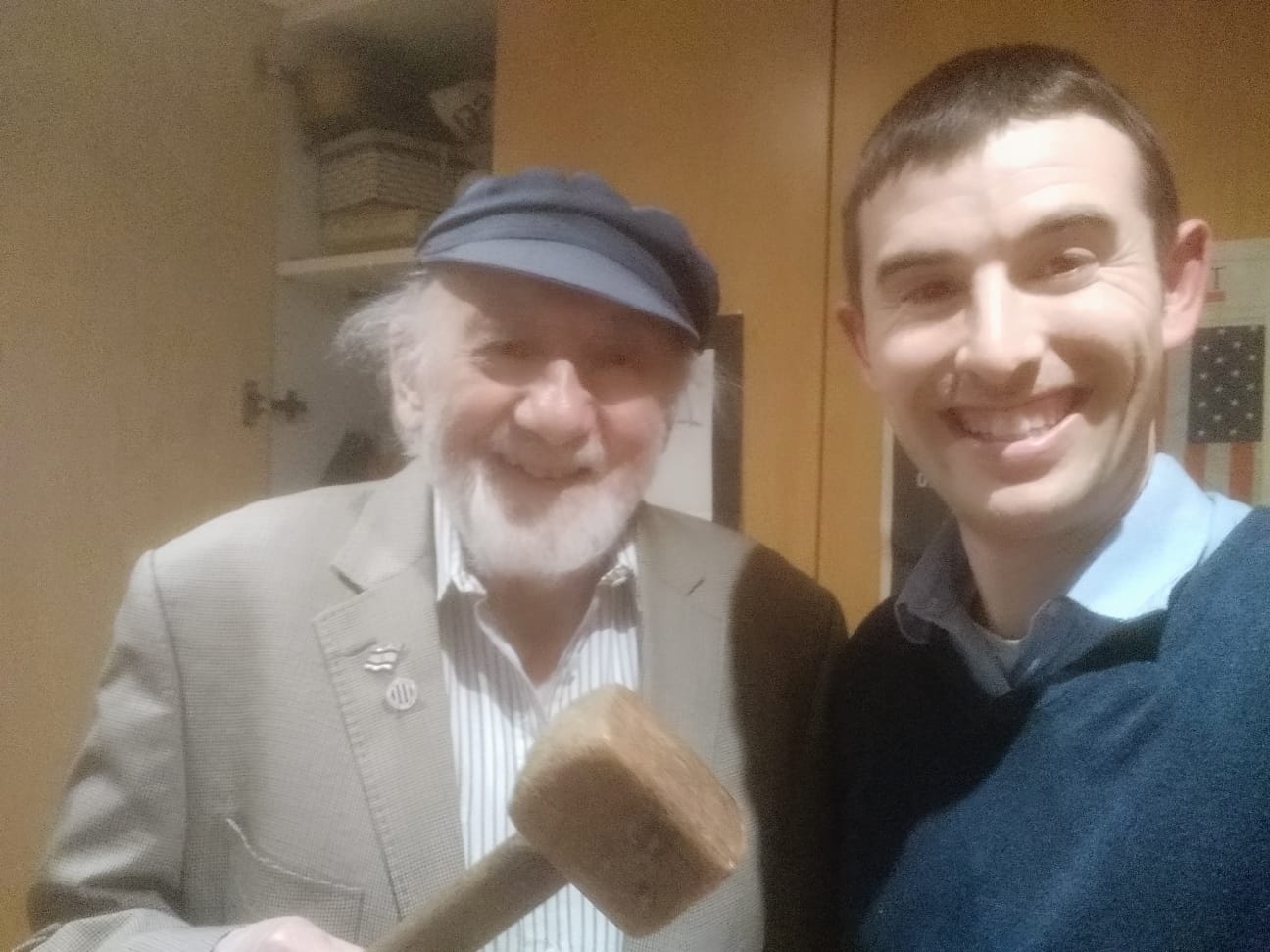
Rowledge House - 1942-1945
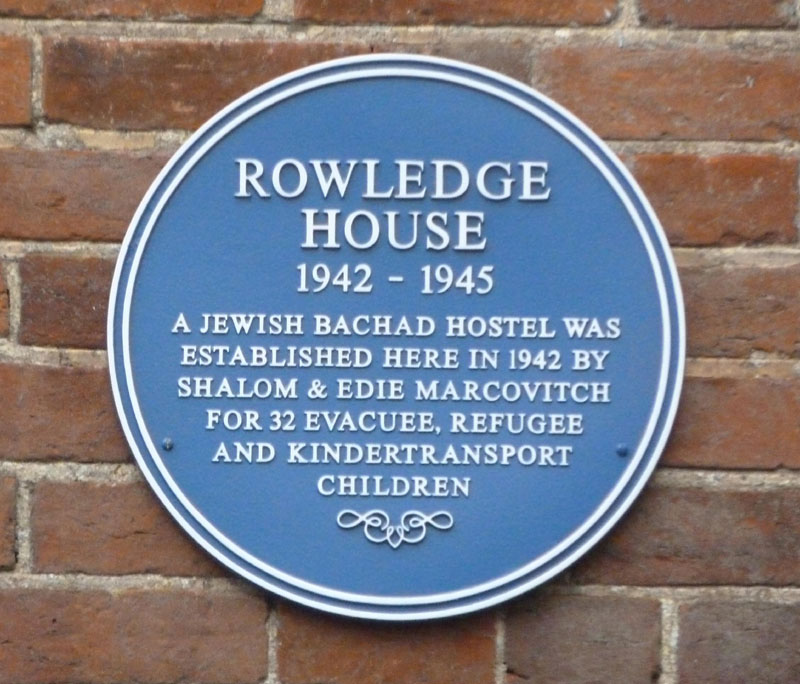
Jack Sklan's Memories
The First Gathering (Kinus) of BA in 1940 over Christmas holidays at Gwrych Castle, Abergele, N Wales – Arieh Handler spoke for 3 hours! Jack was in the British army then but had a free weekend so caught a train on Motzei Shabbat.
Arieh got married in Gwrych and was 3hrs late for his own wedding after going to a BA meeting (Veida?). Arieh also missed the birth of his 1st child.
British law was that refugees 16+ could get a visa to UK if they worked in agriculture, which suited BA/Bachad.
At Gwrych they would help local farmers, learn agriculture and Ivrit
After 18 months in Gwrych, the local Marquis walked past with his agent and asked what the sound of singing was (it was zemirot). When he found out they were Jews, he said “Get them out of here! I didn’t know they were Jews”.
(Marquis was presumably Thomas Cochrane, 13th Earl of Dundonald (1886-1958) , who was also 4th Marquess of Maranh㯬 the latter being a Brazilian title. However, as Gwrych had been requisitioned by the Government, did Dundonald have a say in what it was used for?)
Harold Sklan set up Bet Chalutz at 1 High Road, Tottenham. Chaverim from abroad stayed there until they got a permanent place. Harold was conscripted and phoned Jack the day war broke out to ask him to run BC. Jack did and married the secretary! She later ran Gan Chovah in Emek Refaim, to do with Emunah GB
Jack’s son David was BANGO and youngest professor in Israel (in milk); daughter Judith in charge of svivot south of Thames! (Croydon etc). Eldest daughter Naomi not so active but was lecturer in St Thomas Hospital, v unusual for a girl.
Svivot post-war included Wembley (post-war machers were Jerrold and Murray Roston, Herbert Kaufman), Kenton, Stanmore, Golders, Cricklewood, Willesden, Hendon, Edgware, Manchester. Had specific person in charge of NE London.
The Sklans only spoke Ivrit on Friday night (had dictionary on table).
Arieh Handler worked before WW2 in 1937-38 as manager of an agricultural centre for Bachad – allowed to travel. After Kristallnacht he was told to leave Germany and was sent to UK to start Bachad.
Arieh realised that BA was only source of supply to Bachad so took over BA and made it focussed on agricultural aliyah – real need in Israel for agricultural labourers
During war, Bachad bought Thaxted
Every 2 years there was an agricultural show – one year a cow called Devorah won 2nd Prize – an Earl won 1st prize and the Queen came 3rd! Bachad made lots of money by this and brains behind it, Akiva (Kuli) Landau was later in charge of strategic planning in Israel’s Ministry of Agriculture
BA/Bachad leader Herbert Laster died towards end of war when his RAF plane shot down by Bulgarian friendly fire
Jack helped Bachad more than BA; Bachad preceded Arieh Handler
Jack got first donations to Friends of Bachad (such as gabbai funds from his dad’s Rosh Hashanah wartime minyan)
Founders of Bachad in 1937 were Abba Bornstein, Persoff, Ezelbaum. Had difficulties in 1938, Arieh got kids over from Europe on the day of the war to Gwrych (lucky that was there, was a lifesaver)
David Intralegater, a Shaliach, told Jack to strengthen BA and sent Arieh Handler to do it
Intralegater came in 1936 and said that Habonim, which was started by Gilbert and fairly frum/traditional, wasn’t enough – there is a need for BA
R’ Cherrick from New Synagogue, Egerton Road, eventually agreed to have BA and Habo share the premises at different times.
First BA meetings at Sklan house, 32 Woodberry Down, near Manor House station. Met in the large nursery downstairs (8 Sklan kids so lots of room)
First meeting was in 1936 (after Succot?) started by Cecil Sklan and Benny Pollak.
At first BA was ages 8-16, Bachad 16+
Mizrachi started in 1919 – Shlomo Eliezer Sklan (Jack’s dad) one of founding members.
1st Sklan child was Betty/Rivka – 1st chair of women’s Mizrachi and married a man with surname of Boxer
2nd – Jack/Yitzchak Yaakov – started Kinneret with Myer Silverstone (see below), became exec in charge of fundraising for Bachad after war
3rd – Cecil – started BA, called to up to army in 1939, was POW in Stalag 7B next to Auschwitz for 4 and a half years, was camp interpreter, after war moved to Westcliff, set up BA there, died 1973
4th – Harold – started Bet Chalutz, after war went to USA
Jack started youth service in Wembley shul after war – many grew from this, one even became head of a BA Yeshiva in Beersheva
Jack’s son in law is Stuart West
Kinneret for 16-18 year olds not political/religious rather fundraising/propaganda for Israel – everyone would support it. Included Ivrit classes, lectures from Israelis – had 40-50 members, met in New Synagogue classrooms. It started in 1932 and was successful but by 1934 it split: Mizrachi persuaded Myer to change it to Young Mizrachi, thus forcing the less religious to join General Zionists.
Jack visited Israel in 1933 then became chair of North London Young Zionists AND chair of East London Young Mizrachi – i.e. he tried to stay in both camps. He said to people “They’re all Jews, what’s the matter with you…I’m open to all Jews”.
BA after starting in Stamford Hill moved to Brondesbury, Cricklewood, Hendon, Edgware
Intrelegater had an office – the Mizrachi one – where there was a meeting to persuade BA to allow Arieh Handler to be Head; Jack was in favour, as Arieh would be full time – others less keen for German to arrive and take over – but they said yes
Supporters of BA in Manchester – Rabbi Rosen, Kaper, Louis Jacobs! Sidney Hamburger, Grosskopf, Pfeffer all encouraged BA
After war Gubby Haffner (Yehuda Avner), Herbert Lester, Asher Cailingold ran BA. Shaliach – Yitzchak Meir, later ambassador to Belgium and Switzerland.
After Gwrych Bachad went to Bromsgrove, Buckingham then Thaxted which became biggest place. Jack got funds to build a house in name of CR’s wife, Lady Brodie.
BA ran from Cazenove Rd, Stamford Hill at a bigger Bet Chalutz
Asher Cailingold's History of Bnei Akiva
In the year 2000 Asher Cailingold wrote a chapter on the history of Bnei Akiva and Bachad in the book titled ‘The Jewish Emigrant from Britain, 1700-2000’
Key Events
1940 – First Pegisha
1942 – First Summer Camps
1944 – Thaxted Farm Purchased

